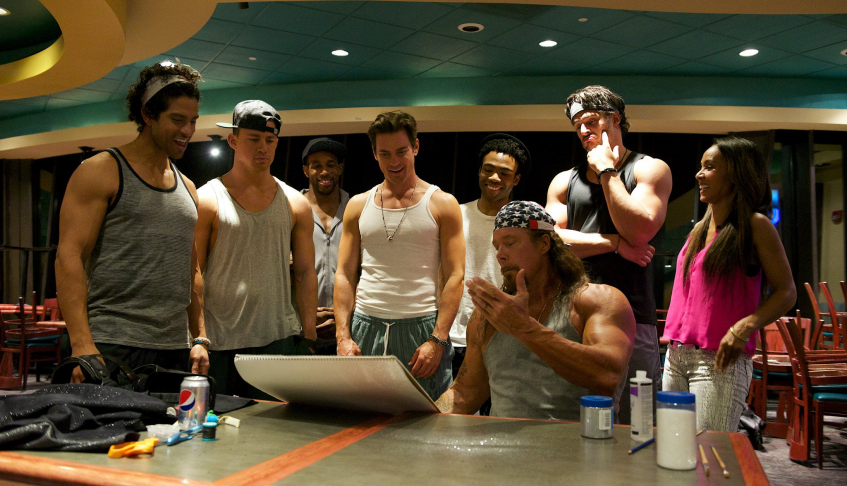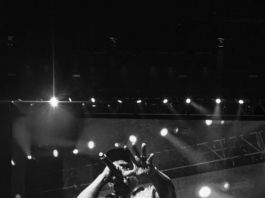By Michael Scoular (The Cascade) – Email
Print Edition: July 15, 2015
 Magic Mike XXL opens with a medium close-up of Channing Tatum seated on a porch swing, waves and evening breeze and twilight suggested by the sound design (by Dennis Towns, whose editing and mixing work is among the best at combining the mundane echoes of small interiors and the filtered ambience that lives outside). Here he is: the reason you came to see this, but he’s all business, staring off into the middle distance, thinking, we’ll soon find out, about his dissatisfying domestic life and the day-to-day nags of building a moderately successful business.
Magic Mike XXL opens with a medium close-up of Channing Tatum seated on a porch swing, waves and evening breeze and twilight suggested by the sound design (by Dennis Towns, whose editing and mixing work is among the best at combining the mundane echoes of small interiors and the filtered ambience that lives outside). Here he is: the reason you came to see this, but he’s all business, staring off into the middle distance, thinking, we’ll soon find out, about his dissatisfying domestic life and the day-to-day nags of building a moderately successful business.
“We have got to get a retail space,” he says a few minutes later to his one employee. “I am so sick of these contractors nickel-and-diming us all day.” Where the first Magic Mike ushered its audience behind a fantasy life into an oiled-up family, this one reminds: careers are short. Like last year’s Step Up All In (a movie that deserved to be talked about in the same breath as other “art’s nice, but I don’t see the money in this” works like Inside Llewyn Davis and Frances Ha, but wasn’t, because critics take Greenwich Village folk singers and New York City modern art apprentices seriously, not street dancers), Magic Mike XXL combines contemporary fears and dreams of career stability with musical abandon, set to fluid, steady camerawork. And where the first Magic Mike was driven by its ascending star plot, XXL is loose, a hangout movie, where dialogue flows with background jokes, catch-up questions, and taunts. Dance sequences, no longer taking a backseat to getting-to-know-you conversations, break out in any space they can be invented in, none of them as mundane and cloistered as the Xquisite club where just about all the whole dream-work life of the first Magic Mike took place.
Steven Soderbergh did not direct this sequel, but he’s still around as cinematographer, editor, and producer, and for that reason some might still see this as his work — many of his technical collaborators remain in their same roles, and the only major shift is that the director now is Gregory Jacobs, Soderbergh’s regular assistant director, whose two previous works are small-scale genre flicks. But where Soderbergh is sometimes hailed as an independent star (depending on who you ask, you might get as many as a dozen ideas of what his best movie is), Jacobs’ approach to the world of male entertainers is, suprisingly, more in sync with both the world of Tampa drag clubs, exclusive parties, and pleasure-sense overload, as well as the ideas in this sequence of films: both the construction of bliss in its ideal, uncomplicated form, and the snags and pressures that bliss is an escape from.
Soderbergh, who has spoken repeatedly of the “tyranny of narrative,” pits, de-bones, twists somewhat straightforward scenarios. He has endless nostalgia for the New American cinema of the 1970s, but also takes the past as a challenge, to recreate it (particularly in The Limey and The Good German), only so that it can be scuffed and shown as more fallen and less simple than you remember it. The audience zigs, Soderbergh zags, etc. So where Soderbergh shot the first Magic Mike’s dance scenes in shadows, from a distance, in a small, cramped space that can fit, with difficulty, a couple hundred people, Jacobs embraces the musical tradition: an early quasi-improvised awakening dance by Tatum is part Gene Kelly exuberance, part clumsy dreamer kicking over equipment and breaking tables; club scenes are lit and timed to heart-swelling DJ-set transitions (Bando Jones’ “Sex You” comes in pin-drop still, then takes over the scene, but not so much you can’t still hear the slap of a dancer’s hand claps); and some choreographed long takes strike like the heart of a liberated Broadway, large and unabashedly direct, the camera swinging as if to raise an audience off the Earth, into the headspace of performers and the women they dance for.
The wonder of these movies is how they do not seem to unnaturally bend to Tatum as a star, yet give him and the rest of the cast a fit, in terms of humour, in terms of emotional range, in terms of physical skill that carries with it years of dedication. In a world of perfect, theme-spelling hero scripts and their quick-witted sarcastic comebacks, Tatum is sometimes dumb; he starts to say something that sounds smart, until he hears himself saying it; he pulls off a great move, but in a kitchen, without the benefit of a sound system and an eager audience.
Even though his appeal as an above-the-title actor could seem to be beyond the people surrounding him, not only does he seem to belong with the group, all almost-getting-a-break, all worrying-the-end-is-nigh, he actively shares the spotlight on both sides of the production. Tatum is not credited with writing the script or choreographing any numbers, but screenwriter Reid Carolin and choreographers Alison Faulk, Teresa Espinosa, and Luke Broadlick have spoken of his close involvement. As for the cast, a lot of the appeal of these movies is seeing less-prolific actors flourish in the demanding but freeing atmosphere of dance-devising and execution: Jada Pinkett Smith, in her best work since her collaborations with Michael Mann and the Wachowskis a decade ago; Stephen “Twitch” Boss, from the last three Step Up movies (where Tatum got his start as well); Matt Bomer, Adam Rodriguez, Joe Manganiello, and Donald Glover, known mainly for television roles; Gabriel Iglesias, a comedian; Kevin Nash and Michael Strahan, former professional athletes; and Andie MacDowell, who has not had a film role this good since the 90s. Carmen Cuba, the casting director here, for Soderbergh films since The Girlfriend Experience, and for the sprawling, similarly likeable ensemble of Sense8, can apparently call it when an actor has the ability to create a performance of joy, safety, and grounded sexuality, no matter what a glance at a resume highlights.
Most movie romances are elitist: they say love is going to happen between two very narrowly selected people. They will bond over esoteric quirks and their soundtrack will be bands you’ve probably only heard of if you’re cool. They will live in places you probably won’t even bother to flip to in the real estate pages. In Magic Mike XXL, a movie set in sleepless hotel rooms, roads, not airplanes, and in vans where people talk about the Backstreet Boys and junk food, love is, in an obvious way, linked to money: it’s how you get in the door to see these men, it’s what you shower them with. But as Smith, in her emcee motivational sermons says, and as Glover, in a late night car conversation calls it, this is, though some may scoff, a kind of democratic catharsis: it’s the same “you deserve to be told you’re beautiful” stage drama of Justin Bieber’s in-concert “One Less Lonely Girl” calling up an audience member, but for people who know the banality of betrayal, and the disappointment, for example, of a statistic like how 96 per cent of the opening week audience for Magic Mike XXL was women. A common reaction to the Magic Mike movies is some variation of a verbal fainting spell, maybe the word “pornography,” an attempt at mockery. But anyone who’s seen the movie knows how crowds react to it, and how, in the dance scenes, like in Sofia Coppola’s video for Phoenix’s “Chloroform” (but turned up to 11), the constant repeating shot is of women, ecstatic, knowing it is their desires that are being listened to.




